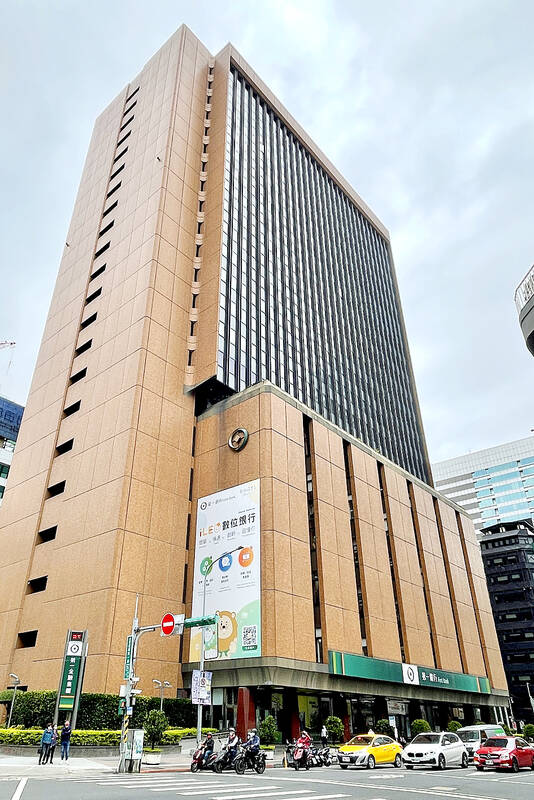State-run First Financial Holding Co (第一金控) yesterday lowered its loan growth target for this year from 5 percent to 4 percent after Taiwan’s GDP growth and exports fared weaker than expected.
The conglomerate revised down the target even though its net profit last quarter grew 34.1 percent year-on-year to NT$6.63 billion (US$215.5 million) on the back of currency swap gains, First Financial investment relations head Anne Lee (李淑玲) said.
The results translated into earnings per share of NT$0.50.

Photo: George Tsorng, Taipei Times
Profit momentum linked to currency swaps might be sustainable this year, thanks to interest rate differentials between the local currency and the US dollar, although it is widely believed the US Federal Reserve would halt rate hikes this month, Lee said.
The bank-focused conglomerate raised projections for swap gains to NT$12 billion this year, from its previous forecast of NT$9 billion, after posting NT$4 billion in gains in the first quarter, Lee said.
However, Taiwan’s disappointing economic and export performance warranted a downward revision for the loan book’s growth trajectory, as companies are likely to turn conservative about capital spending and business expansion amid the economic uncertainty, Lee said.
First Financial now expects a 4 percent increase in loans to small and medium-sized enterprises, and organic growth of 3 percent in mortgage operations, Lee said.
Inflation and interest rate hikes have prompted corporate and retail customers to tighten their belts, the official said.
Foreign currency lending would advance by 6 percent, from the 9 percent it projected three months earlier, Lee said.
Fee income would rise by 5 to 6 percent, driven by its wealth management business, as high yields would help boost investment appetite after unease over bank failures in the US and Europe settles, Lee said.
Profit contributions from overseas and offshore operations shrank to 23.61 percent, from 37.02 percent in the preceding quarter, dragged by credit losses in connection to medical care services and real-estate developers in Europe, Lee said.
The official said she is not particularly worried about more bad loans as First Commercial Bank (第一銀行) has set aside higher provisions than legally required.
On the contrary, the lender might see a bad loan recovery, Lee said.
First Financial lowered its dividend payout ratio to 51.3 percent of its earnings last year, compared with an average of 70 percent in the past few years.
Lee said the retreat had much to do with the negative value of its other comprehensive income (OCI) account.
The situation should improve when the OCI account returns to positive territory and profitability puts up a robust showing, she said.

When an apartment comes up for rent in Germany’s big cities, hundreds of prospective tenants often queue down the street to view it, but the acute shortage of affordable housing is getting scant attention ahead of today’s snap general election. “Housing is one of the main problems for people, but nobody talks about it, nobody takes it seriously,” said Andreas Ibel, president of Build Europe, an association representing housing developers. Migration and the sluggish economy top the list of voters’ concerns, but analysts say housing policy fails to break through as returns on investment take time to register, making the

‘SILVER LINING’: Although the news caused TSMC to fall on the local market, an analyst said that as tariffs are not set to go into effect until April, there is still time for negotiations US President Donald Trump on Tuesday said that he would likely impose tariffs on semiconductor, automobile and pharmaceutical imports of about 25 percent, with an announcement coming as soon as April 2 in a move that would represent a dramatic widening of the US leader’s trade war. “I probably will tell you that on April 2, but it’ll be in the neighborhood of 25 percent,” Trump told reporters at his Mar-a-Lago club when asked about his plan for auto tariffs. Asked about similar levies on pharmaceutical drugs and semiconductors, the president said that “it’ll be 25 percent and higher, and it’ll

CHIP BOOM: Revenue for the semiconductor industry is set to reach US$1 trillion by 2032, opening up opportunities for the chip pacakging and testing company, it said ASE Technology Holding Co (日月光投控), the world’s largest provider of outsourced semiconductor assembly and test (OSAT) services, yesterday launched a new advanced manufacturing facility in Penang, Malaysia, aiming to meet growing demand for emerging technologies such as generative artificial intelligence (AI) applications. The US$300 million facility is a critical step in expanding ASE’s global footprint, offering an alternative for customers from the US, Europe, Japan, South Korea and China to assemble and test chips outside of Taiwan amid efforts to diversify supply chains. The plant, the company’s fifth in Malaysia, is part of a strategic expansion plan that would more than triple

Taiwanese artificial intelligence (AI) server makers are expected to make major investments in Texas in May after US President Donald Trump’s first 100 days in office and amid his rising tariff threats, Taiwan Electrical and Electronic Manufacturers’ Association (TEEMA, 台灣電子電機公會) chairman Richard Lee (李詩欽) said yesterday. The association led a delegation of seven AI server manufacturers to Washington, as well as the US states of California, Texas and New Mexico, to discuss land and tax issues, as Taiwanese firms speed up their production plans in the US with many of them seeing Texas as their top option for investment, Lee said. The